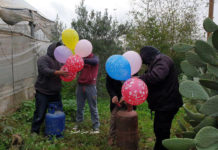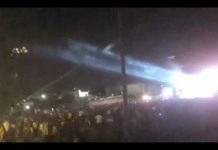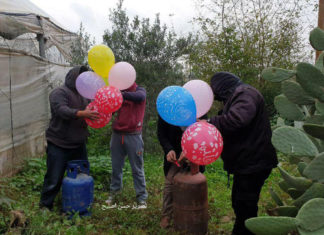A Hamas official inadvertently acknowledged on Thursday that the group had strong-armed journalists in Gaza into a reporting style that suited its narrative, keeping many under surveillance and kicking out of the territory those who sought to film the launching of rockets at Israel.
In an interview with Lebanon’s al-Mayadeen TV on Thursday, relayed and translated Friday by the Middle East Media Research Institute, the head of foreign relations in Hamas’s Information Ministry, Isra Al-Mudallal, complained that “the coverage by foreign journalists in the Gaza Strip was insignificant compared to their coverage within the Israeli occupation (Israel).”
“Moreover,” she said, “the journalists who entered Gaza were fixated on the notion of peace and on the Israeli narrative.” She asserted that the foreign press was focused “on filming the places from where missiles were launched. Thus, they were collaborating with the occupation.” (The Israeli army said last week that 600 of the 3,300 rockets fired into Israel over recent weeks were launched from residential areas, including schools, mosques and homes.)
“These journalists were deported from the Gaza Strip,” al-Mudallal said. “The security agencies would go and have a chat with these people. They would give them some time to change their message, one way or another.
“We suffered from this problem very much,” she added. “Some of the journalists who entered the Gaza Strip were under security surveillance. Even under these difficult circumstances, we managed to reach them, and tell them that what they were doing was anything but professional journalism and that it was immoral.”
On Monday, the Foreign Press Association, an umbrella group representing foreign journalists working in Israel and the Palestinian Authority, issued a strongly worded condemnation of Hamas’s intimidation tactics and its interference with their reporting in Gaza.
“The FPA protests in the strongest terms the blatant, incessant, forceful and unorthodox methods employed by the Hamas authorities and their representatives against visiting international journalists in Gaza over the past month,” the statement said. “The international media are not advocacy organizations and cannot be prevented from reporting by means of threats or pressure, thereby denying their readers and viewers an objective picture from the ground.”
As well as targeting journalists in Gaza, the press organization said it was aware that Hamas had been taking steps to vet those media personnel it did not approve of and to prevent them from reporting in Gaza.
“Such a procedure is vehemently opposed by the FPA,” the statement said.
The FPA asserted that “in several cases, foreign reporters working in Gaza have been harassed, threatened or questioned over stories or information they have reported through their news media or by means of social media.”
In an article for Haaretz on Wednesday that highlighted the FPA condemnation, reporter Matthew Kalman said “Hamas repeatedly demanded a list of the names of correspondents” who were using a specially-chartered bus via a safe passage route into Gaza, “in order to draw up a blacklist of individuals and networks.”
Kalman wrote that “Some reporters received death threats. Sometimes, cameras were smashed. Reporters were prevented from filming anti-Hamas demonstrations where more than 20 Palestinians were shot dead by Hamas gunmen.”
In what Kalman called “perhaps the most serious incidents considered by the FPA,” he said, “Hamas began firing mortars right next to the location of foreign reporters, in what may have been an effort to draw Israeli retaliatory fire.”
Kalman noted that New York Times correspondent Jodi Rudoren disputed and criticized the FPA statement: “‘Every reporter I’ve met who was in Gaza during war says this Israeli/now FPA narrative of Hamas harassment is nonsense,’ Rudoren tweeted, referring to Israeli accusations that Hamas pressure on foreign reporters had helped massage the messages coming out of Gaza in the last month.” And he said Rudoren’s Tweet “was followed by a furious email exchange with the FPA, in which Rudoren denounced the statement as ‘dangerous.’”
A numbers of reporters working in Gaza reported on Hamas’s use of civilian infrastructure for military means, but said they were only able to do so once out of the Strip, for fear of Hamas reprisals.
A report by India-based NDTV last week on Hamas assembling and firing a rocket next to a hotel used by journalists was filed hours after the reporter left Gaza, because “Hamas has not taken very kindly to any reporting of its rockets being fired,” NDTV’s Sreenivasan Jain wrote.
Stuart Winer contributed to this report.









